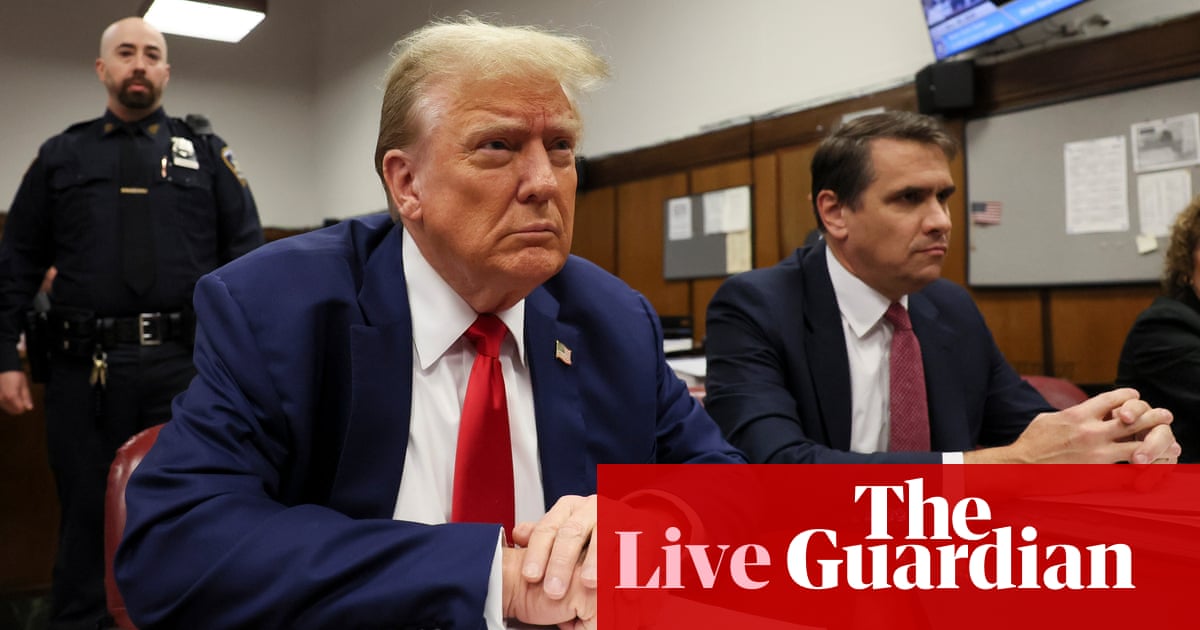Prosecutor aims to show Trump at center of personal and company finances
Victoria Bekiempis
The prosecution is trying to show jurors that Donald Trump was directly responsible for his personal and companies’ finances.
Prosecutor Matthew Colangelo asked: “Who has the authority to approve invoices?”
Witness Jeffrey McConney, for former Trump Organization controller, replied: “President Trump, before he became president.” He said when Trump was in the White House, persons authorized to greenlight invoices included former chief financial officer Allen Weisselberg and Trump’s adult children.
Questions to McConney are trying to establish there was a fixed process for authorizing and recording expenses, long-established procedures that Trump then consciously flouted to disguise the hush-money payment to adult film star Stormy Daniels.
That would contradict the defense’s seeming position, which was that Trump was a distracted multi-tasker who might have been busy on the phone while signing checks.

Colangelo asked McConney about the position of Trump’s former fixer, Michael Cohen, in the Trump Organization. Cohen was, of course, the person who facilitated the payment to Daniels.
“He said he was a lawyer,” McConney said, prompting a low laugh in the gallery.
Alina Habba, another one of Trump’s attorneys, who is not involved in this case, and who is sat in the front row, also showed a grin.
Colangelo asked McConney about a conversation he had with Weisselberg about repaying Cohen. “We have to reimburse Michael,” McConney recalled Weisselberg saying. “He tossed the pad toward me, I started taking notes on what Allen said.”
Weisselberg is, of course, a disgraced former Trump employee and loyalist, and is currently serving a five-month prison term for perjury after he lied to investigators in Trump’s previous civil fraud case.
Key events
Bove is attempting to chip away further at the purported motive, suggesting that Michael Cohen might have had a retainer agreement after all.
“You see where it says ‘retainer agreement?’” Bove asked McConney, pointing to a copy of one of Cohen’s invoices displayed on the screen.
“Retainers can be verbal, correct?” McConney answered in the affirmative.
“This invoice from Trump’s personal attorney, for Trump’s personal legal expenses, does not say anything about the Trump Organization?” Bove pressed.
“No”, McConney replied.
Trump lawyer: ‘No falsification’ in legal expense payments

Hugo Lowell
During the cross-examination, Donald Trump’s lawyer Emil Bove suggested that the alleged falsification was not a falsification at all: that “legal expense” was just a catch-all label used on the Trump Org’s internal system when entering any payments to any lawyer.
Former Trump Org executive Jeffrey McConney said “legal expenses” was chosen because it was in a dropdown menu in an antiquated accounting software that was rigid in what labels could be used for payments.
This gets to the intent: Bove is suggesting there was no intent to deceive.
Bove’s cross-examination of former Trump Org executive Jeffrey McConney is fast and furious.
McConney admitted he had “very few” conversations with Donald Trump in the 36 years he worked for the company, and had not spoken with him at any time about the events outlined earlier by prosecutor Matthew Colangelo, relating to how expenses were paid and recorded.
Regarding payments to Michael Cohen, McConney conceded Cohen was Trump’s personal attorney, that payments to lawyers were “legal expenses”, and that he had recorded them in the ledger as such.
It’s an effort, and a seemingly powerful one, to disassociate Trump from any falsification of business records by introducing at least reasonable doubt he had any direct knowledge or involvement. Or indeed that any payments were actually improper.
Prosecutor Matthew Colangelo closed his direct examination of former Trump Organization executive Jeffrey McConney by asking about a financial disclosure report he prepared for then president Trump for 2017.
It drew an objection from the Trump attorney Emil Bove and a sidebar when Colangelo attempted to enter the report into evidence.
McConney’s testimony this morning appears to have helped prosecutors make headway with one of their key claims against Trump, namely that he was aware of and directly involved in the falsification of records over the reason for his hush money payment to adult movie star Stormy Daniels.
Now it’s the turn of Bove to cross-examine McConney, and repair any damage he caused the defense. Already, he has got McConney to concede that Trump did not directly ask him to falsify any records or record anything improperly.
Jurors have been shown Trump Organization ledger reports that recorded payments to former Trump fixer Michael Cohen. Multiple repayments were coded to an account as a “legal expense” and the lines say “retainer”.
Note that Jeffrey McConney, retired Trump organization executive, has been telling the jury that he never saw a retainer agreement with Cohen in relation to these expenses, so prosecutors are continuing to build the foundation of their argument that the hush money repayment was falsely labeled as legal expenses on business documents.
McConney is now being asked if he knows about the Organization for Government Ethics. He said yes, and that as far as he is aware, the Trump Organization had to file an annual disclosure report.
“It’s a filing, a conflict of interest form that the government requires certain individuals to file, annually, semi-annually … but the president had to file this form annually,” McConney said.
Prosecutor Matthew Colangelo asked whether Trump filed it both as a candidate and president. McConney said that he recalled him filing since declaring his candidacy in 2015 until leaving office in 2021.
And we’re back… Jeffrey McConney, the retired Trump Org executive who’s testifying about the company’s accounting procedures, and Eric Trump, Donald Trump’s son, briefly acknowledged each other as McConney walked past on his way back to the witness stand.
We can expect some closer scrutiny of the company’s finances and handling of expenses, and then a cross-examination of McConney by the former president’s defense attorneys.
Stick with us for developments as they happen.
Court has recessed for its mid-morning break.
Jeffrey McConney , the former Trump Organization controller, will return to the stand when the hearing resumes shortly.
It’s a painstaking process in court right now. Prosecutors are going through each invoice Michael Cohen sent to financial executives of the Trump Organization.
Donald Trump’s “fixer” invoiced monthly, and his “repayments” were supposed to be $35,000 per month over the course of one year.
This questioning appears tedious, but it’s important for prosecutors to show that misdirection of these payments’ true purpose was repeated and known, further belying any defense claims that Trump was distracted, or unaware of where the money was going, or what it was for.
‘DJT needs to sign check’: Ex-Trump Org controller testifies about Michael Cohen’s invoicing
Colangelo is asking McConney about emails that detail Cohen’s invoicing, and his reimbursement. Cohen invoiced McConney, who checked in with Weisselberg about handling payment.
“Please pay as per agreement with Don and Eric,” Weisselberg wrote to McConney, referring to Donald Trump Jr and Eric Trump, Donald Trump’s adult sons who were running the company in February 2017 after he became president.
While the invoice was cast as a “retainer for the months of January and February 2017” in these exchanges, Colangelo’s questioning revealed that this seemed like anything but. McConney testified he had never seen a retainer agreement or sent any invoice to the legal department.
Donald Trump’s express knowledge of the alleged illicit repayment plan to Cohen is crucial here. Starting around March 2017, for example, repayments were going to come from Trump’s personal account, not a trust that held his assets.
That month, Cohen asked McConney about the status of his latest invoice. “Yes, I’ll check status tomorrow. DJT needs to sign check,” McConney wrote.
Colangelo asked who was DJT, to which McConney said, “Donald Trump”. They “had to get it to the White House” because Trump himself had to sign checks from his personal account, McConney said.

Hugo Lowell
Colangelo’s thrust here is that the money paid to Cohen in January 2017 was not “expenses”, at least as how the Trump Organization processed them.
It gets to the heart of the prosecution’s case, which is that what was recorded as “expenses” to Cohen were false.
McConney acknowledged that Cohen’s reimbursement for $180,000 – which prosecutors allege was falsely recorded as “legal expenses” – was the only expense in his roughly 35 years at Trump Org he knew of that was grossed up for tax purposes.
Prosecutor Matthew Colangelo’s questions about repayments to Cohen touch on prosecutors’ claims about motive.
Donald Trump, they have made clear at multiple points during the trial, was infamously cheap. Therefore, Cohen’s receipt of more money than he’d paid to Daniels indicated that Trump was giving him special treatment … seemingly to maintain his then lawyer’s silence about the alleged hush money cover-up to the adult movie star.
“Do these notes show that Mr Cohen was receiving $360,000 back on a $180,000 expense?” Colangelo asked.
“Yes,” McConney replied.
“Are you aware of another incident where an expense was doubled because of taxes?” the prosecutor pressed.
“No,” McConney said.
Another notable face in the crowd: Donald Trump’s son Eric, although he doesn’t seem to have bagged himself the best of seats.
Eric Trump is sitting next to Alina Habba (another of his father’s attorneys not involved in this case) in the front row, and is directly behind his father with a good view of the back of his head. He keeps looking toward the TV screen at his left, which is projecting video of the defense table.
It’s the only way Eric Trump can see his father’s reactions to the testimony.
On the stand, meanwhile, Jeffrey McConney, a retired senior executive of the Trump Organization, is describing notes he took during a January 2017 meeting where fAllen Weisselberg, former CFO of the Trump Organization, told him that Trump fixer Michael Cohen was owed money.
Cohen, they determined, was owed about $420,000, including the alleged hush money payment as well as a bonus, his regular pay, and an additional amount to cover taxes.
Prosecutor aims to show Trump at center of personal and company finances
Victoria Bekiempis
The prosecution is trying to show jurors that Donald Trump was directly responsible for his personal and companies’ finances.
Prosecutor Matthew Colangelo asked: “Who has the authority to approve invoices?”
Witness Jeffrey McConney, for former Trump Organization controller, replied: “President Trump, before he became president.” He said when Trump was in the White House, persons authorized to greenlight invoices included former chief financial officer Allen Weisselberg and Trump’s adult children.
Questions to McConney are trying to establish there was a fixed process for authorizing and recording expenses, long-established procedures that Trump then consciously flouted to disguise the hush-money payment to adult film star Stormy Daniels.
That would contradict the defense’s seeming position, which was that Trump was a distracted multi-tasker who might have been busy on the phone while signing checks.
Colangelo asked McConney about the position of Trump’s former fixer, Michael Cohen, in the Trump Organization. Cohen was, of course, the person who facilitated the payment to Daniels.
“He said he was a lawyer,” McConney said, prompting a low laugh in the gallery.
Alina Habba, another one of Trump’s attorneys, who is not involved in this case, and who is sat in the front row, also showed a grin.
Colangelo asked McConney about a conversation he had with Weisselberg about repaying Cohen. “We have to reimburse Michael,” McConney recalled Weisselberg saying. “He tossed the pad toward me, I started taking notes on what Allen said.”
Weisselberg is, of course, a disgraced former Trump employee and loyalist, and is currently serving a five-month prison term for perjury after he lied to investigators in Trump’s previous civil fraud case.

Hugo Lowell
The latest prosecution witness Jeffrey McConney, retired former Trump Organization senior vice-president and controller, is testifying now.
He’s running through how the company was structured, and how its accounts were overseen. McConney is appearing pursuant to a subpoena from the Manhattan district attorney’s office, and his legal bills are being paid by the Trump Organization.
McConney is serving as the prosecution’s witness to describe Trump’s accounting practices, meaning we are entering a new phase of the trial, from witnesses describing how the hush-money conspiracy worked to how the records were allegedly falsified.
Here’s another image of Donald Trump in court on Monday, about to learn he’s been fined another $1,000 for violating his gag order.

